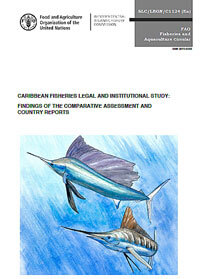SPORTFISHING MIGHT BE CHARGED TO HELP ALLEVIATE POVERTY IN THE CARIBBEAN… SHOULD THAT FALL WITHIN REASONABLE FISHERIES MANAGEMENT?
 The Caribbean Billfish Project, a $1.95 million exercise supported by the UN and the World Bank, and executed by the Western Central Atlantic Fisheries Commission (WECAFC) in Barbados, proposes a ” rights-based” billfish management strategy for commercial, recreational and coastal fishers.
The Caribbean Billfish Project, a $1.95 million exercise supported by the UN and the World Bank, and executed by the Western Central Atlantic Fisheries Commission (WECAFC) in Barbados, proposes a ” rights-based” billfish management strategy for commercial, recreational and coastal fishers.
“Rights-based” strategies limit fishing access and allocations through a variety of tools, including licenses, marine reserves, fishery-wide quotas based on catches not landings, stakeholder group administration, cooperatives and payment of fees (rents), etc. One published paper from the Project provides “enough value exists in the recreational fisheries sector to compensate losses in the commercial fisheries sector.” This transfer of financial resources would require recreational fishing boats to pay “rents” to compensate commercial fishers for loss of billfish caught by anglers, not just for landed fish.
Greater benefits could flow to local fishers and billfish if Caribbean nations stopped authorizing foreign fleets to fish in their waters and stopped re-flagging other fleets, as fees are collected in both situations. If recreational fishing vessels pay “rents” and foreign commercial fleets pay fees, some nations would collect twice. Distant water fleets threaten Caribbean food security and its sportfishing eco-tourism trade by overfishing billfish and other species. Locals cannot compete.
A second Project study “….recognizes that it is a challenge to apply “rights-based” approaches in the developing world……the answer is to secure rights to the fishery to end the race to fish and to put proper incentives in place to increase wealth and sustainability.” A goal consistent with FAO’s goals to (1) eradicate hunger, food insecurity and malnutrition; (2) eliminate poverty and advance social and economic progress, and (3) manage and use natural resources sustainably. All honorable goals, but they should remain beyond the scope of fishery management. If environmental organizations prevail, “rights-based” management will become mainstream.
“Rights-based” billfish strategies raise questions and uncertainties for Caribbean marinas/resorts, charter operations and tournaments. How could businesses factor in a fee for each billfish caught, not landed? If a fishery-wide quota were met before a scheduled tournament or booked charters, how could businesses meet obligations? If the U.S. embraced the “right-based” strategy for waters around Puerto Rico and the Virgin Islands, would Atlantic billfish management begin to unravel?
Highly migratory marlin cannot be managed as “straddling stocks,” as described in the Caribbean Project. Atlantic billfish fall within the jurisdiction of the International Commission for the Conservation of Atlantic Tunas, a well-established international organization with billfish history for improving management and science, well beyond the Caribbean.
A priority should be to avoid another layer of international billfish management by not placing any responsibility with FAO’s WECAFC in the Caribbean. The $1.9 million would have likely been more beneficial had it been directed toward specific problems faced by local fishers.








